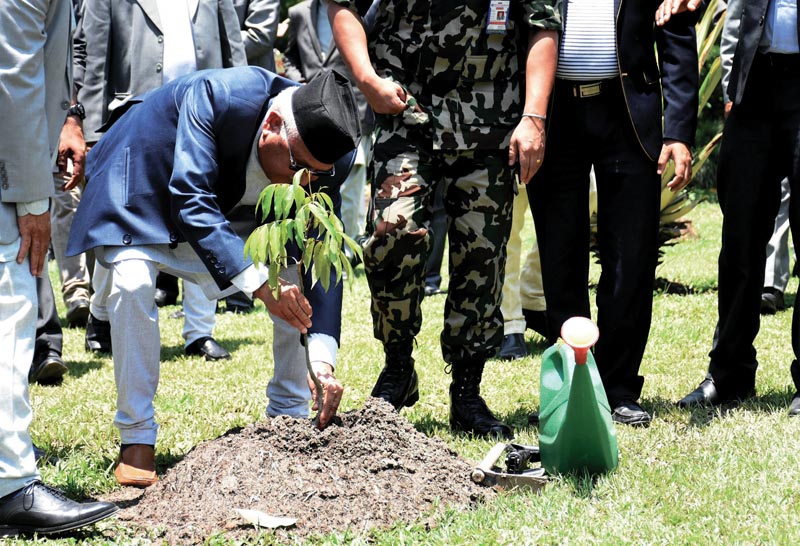World Environment Day marked
Kathmandu, June 5
World Environment Day was marked by organising various programmes across the country today.
At a programme organised by the Department of Environment at Central Zoo in Jawalakhel, Prime Minister KP Sharma Oli appealed everyone to contribute to reduce environment pollution. “We need to take pollution equally seriously as we move towards our development goals.”
Inaugurating ‘Clean Environment Mega campaign’, he claimed that the government planted 100,000 trees to celebrate the day today.
The PM later joined a programme at Singha Durbar, where he planted litchi and avocado trees. He urged everyone to plant at least one tree in each house. Other ministers also joined the tree plantation programme.
Similarly, Kathmandu Metropolitan City said it planted 1,381 trees in 32 wards of the metropolis.
Despite the government’s announcement of a year-long cleaning campaign, the slogan for the day ‘Beat Plastic Pollution: If you can’t reuse it, refuse it’ seemed to have been neglected. The government in April 2015 had banned the import, sale and use of plastic bags below 30 microns in Kathmandu valley. However, no effective measure has been taken for implementation of the ban.
Plastic below 30 microns are non-recyclable and take 450 years to decompose, according to Shanker Prasad Poudyal, spokesperson for DoE. “Until and unless the government introduces new law to completely ban production of plastic bags below 30 microns, it will continue to be used by consumers.”
According to Global Environmental Performance Index 2018, Nepal ranks 176th in terms of pollution among 180 countries. According to a report by UN, one million plastic bottles are purchased every minute globally, while up to five trillion single-use plastic bags are used worldwide every year.
Half of all plastic produced is designed to be used only once. Plastic waste is now ubiquitous in the natural environment.
Globally we produce about 300 million tonnes plastic waste every year, which is nearly equivalent to the weight of the entire human population.
Call for action on pollution
KATHMANDU: Climate and Development Dialogue, a common platform of non-government organisations in Nepal, on the occasion of World Environment Day on Tuesday has drawn the government’s attention to deteriorating air quality in urban areas. It has suggested to the government to reduce congestion of fossil fuel-powered vehicles, industrial pollution and use of pesticides on crops and vegetables. “Internationally it is recommended that metropolitan cites should have at least 40 per cent of the area covered by trees and greenery. However, in Kathmandu valley only nine per cent of the area is covered by trees.” It suggested that the government make Environmental Impact Assessment mandatory for all infrastructure projects as envisioned by the Environment Protection Act.






